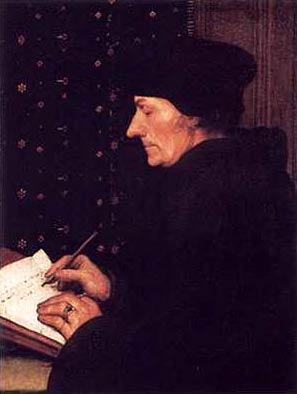 Course Objectives
Course Objectives Course Objectives
Course Objectives
Ths course has a number of pedagogical objectives. Most obviously, it is to provide students with a basic understanding of the causes, course, and consequences of reform in early modern European Christianity, beginning with the “Luther Affair” and ending with the era of confessionalization in the seventeenth century. A related goal is to show students the pervasive effects of religious reform, how it permeated beyond theology and religious observance into every aspect of everyday life.
This course also has some practical goals. The readings focus on primary texts, and one objective is to train students to read such texts carefully and attentively, attending to the structure of language and meaning in times long past. Students will also encounter a number of modern theories about the sixteenth-century Reformations; in this connection, the goal is to train students to understand the logic and structure of historical interpretation and its relationship to primary sources.
A third objective is to train students to write clearly and intelligently on matters of historical interpretation.
Course Requirements (HIST 441)
Typically, our meetings will alternate between lectures and discussion of the readings, so it is imperative that you come to class prepared to ask questions, respond to them, and to discuss the assigned readings in common. Needless to say, attendance is required, and will constitute part of your final grade. For undergraduates, the requirements are as follows:
1) Students are expected to attend every session and participate actively in discussions;
2) There will be a take-home mid-term examination, due by 5:00 pm on Friday of Week 5.
3) Written work will consist of a book review (minimum 3000 words) due at our final session in Week 10; and
4) A final examination.
For the book review, students may choose from any full-length, single-author monograph listed in the course bibliography or in the book-length "Suggestions for Further Reading" found at the conclusion of each chapter in the course textbook. With the instructor's permission, students may also request permission to write on a book not included in the these bibliographies. In addition, students must also consult at least two reviews of the book published in scholarly journals by specialists in the field.
For students taking this course as History 441, the overall breakdown of evaluation is this:
Attendance & Classroom
Discussion: 25%
Mid-Term Examination: 25%
Final Examination: 25%
Book Review: 25%
All work submitted in this course must be your own and produced exclusively for this course. The use of sources (ideas, quotations, and paraphrases) must be properly acknowledged and documented. For the consequences of academic dishonesty, refer to the Schedule of Classes, published quarterly. Violations will be taken seriously and are noted on student disciplinary records. If you are in doubt regarding the requirements for this course, please do not hesitate to consult me. Finally, all written work must be submitted on time; late work will be accepted only with documented medical justification.
If you have a documented disability and anticipate needing accommodations in this course, please make arrangements with me soon. Also, please ask the Counselor for Students with Disabilities to send me a letter verifying your disability.
Like students taking the course as History 441, graduate-level participants are expected to attend regularly and participate actively in discussions of assigned readings. Indeed, graduate students have a special role to play in a course such as this: both students and teachers-in-training, graduate students bear a special responsibility to encourage the learning of their more junior sisters and brothers.
Students taking the course as History 541 are expected to produce a literature review, 15-18 pages in length, due at the last session of term. Graduate students will also be assigned readings from an additional text, C. Scott Dixon (ed.), The German Reformation (Oxford: Blackwell, 1999).
If enrollment in HIST 541 permits it, graduate students will meet separately in a seminar to be scheduled at the beginning of term. In that setting, each graduate student will lead discussion on a topic agreed upon in advance. If enrollment in 541 is too low to warrant a separate seminar, graduate students will instead lead a discussion in class on an arranged topic.